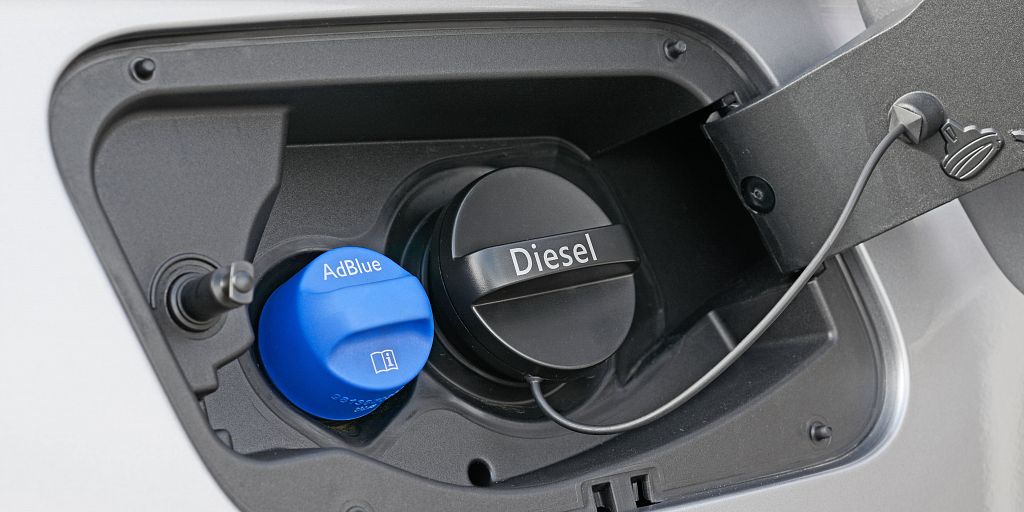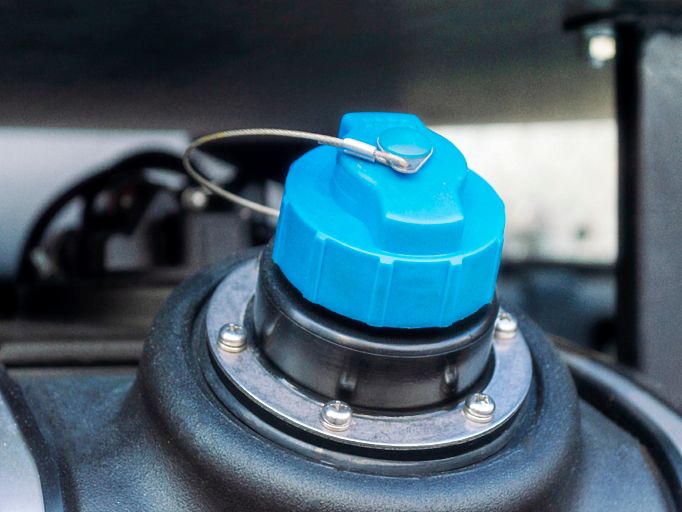Understanding AdBlue: A Guide for Tank Owners
30th June 2024
in adblue
Author: Jack Dunn

At Tanks R Us we stock AdBlue tanks and AdBlue tank accessories. In this edition of our blog, we’ll look into what AdBlue is and why it needs to be stored correctly using the best available tanks.
What is AdBlue?
AdBlue is a widely used Diesel Exhaust Fluid (DEF) designed to reduce harmful emissions from diesel vehicles. The name AdBlue is a registered trademark of the German Association of the Automotive Industry, meaning not all cars use this specific brand. However, like ‘hoover’ slipping into common parlance and becoming a byword for ‘vacuum cleaner’, AdBlue has generally come to signify any DEF.
AdBlue consists of 67.5% deionized water and 32.5% high-purity automotive urea. This urea is synthetic and not derived from urine, despite recurring myth. AdBlue is stored in a tank usually located next to the diesel tank.
How Does AdBlue Work?
AdBlue is not a fuel additive, but an emissions control solution. It helps limit the output of harmful gases (such as nitrogen oxides, NOx) by working in conjunction with the vehicle's Diesel Particulate Filter (DPF) – which, according to gov.uk, are estimated to account for thousands of deaths in the UK per year. When it is injected into the exhaust stream of a diesel engine, AdBlue triggers a chemical reaction. The AdBlue reacts with the nitrogen oxide gas produced in combustion, removes polluting components of the exhaust gas and converts to non-polluting nitrogen, oxygen and water. Known as Selective Catalytic Reduction (SCR), this process significantly reduces emissions - often by up to 90%. It doesn't mix with diesel but operates independently to optimize exhaust emissions.
Usage and Maintenance
Since September 2015 the use of DEFs like AdBlue has been mandatory for diesel vehicles in the EU. This is to ensure that they comply with Euro 6 emissions standards. Diesel cars won't run without AdBlue, which highlights its importance alongside fuel. AdBlue does not negatively impact fuel consumption.
Topping Up AdBlue
If the AdBlue warning light appears, this means there are low levels and you have approximately 1,500 miles to refill. Failing to top up can result in the vehicle entering restricted performance mode and ‘limping home’ until it is refilled. AdBlue needs to be replenished regularly, typically after every 6,000 to 7,500 miles. The filler cap for AdBlue is usually located next to the diesel cap, or under the bonnet. A 10-litre container of AdBlue costs around £10 to £15, and public pumps are available at motorway services. You can also buy it from car supplies shops and superstores, and from local garages. AdBlue should never be added to the diesel tank (or vice versa) as this sort of ‘misfuelling’ can seriously damage the vehicle's exhaust system. However, if for some reason it does occur, then the vehicle’s ignition should not be started, and professional assistance should be sought immediately.
AdBlue Tanks for Business
For logistical reasons, transport companies typically require onsite AdBlue tanks to refuel their HGVs etc. Businesses with extensive diesel fleets may install tanks from anywhere between 100 to 10,000 litres, dependent on the scale of the operation. With stricter emissions regulations, sectors such as construction and agriculture are also adopting SCR systems, therefore requiring AdBlue and methods of storing it.
How Long Does AdBlue Last?
AdBlue has a shelf life of up to approximately 12 months, and an optimal storage life of approximately 18 months. When stored at 25°C or above in a well-ventilated container, its shelf life is reduced to approximately 6 months.
Storing AdBlue
AdBlue must be stored in a cool, dark environment (i.e. between -6°C and 25°C), in a well-sealed container or dispenser. AdBlue freezes at -11°C, so above this temperature must be maintained. However, if it does freeze it can be thawed and reused.
AdBlue contains ammonia, which can corrode certain metals, and incorrect or improper storage can lead to contamination and leakage. Using inappropriate containers can result in contamination, potentially damaging your vehicle and leading to costly repairs, such as replacing the SCR catalyst. The only suitable options for storing AdBlue are high-density polyethylene, polypropylene or stainless steel containers including tanks.
AdBlue Storage at Tanks R Us
We are a leading supplier of AdBlue tanks and AdBlue tank accessories, from leading manufacturers such as Atlas, Deso and Harlequin - so our tanks are the highest quality and will keep your AdBlue safe and in optimum condition. We stock tanks from 220 litres up to 10,000 litres, and also have a hire facility. If your need is on a temporary basis or longer term, we have plenty of AdBlue tanks available at Tanks R Us, and we can provide further guidance if you have any queries. Don’t hesitate to contact us.
Sources:
Azure Chemicals: The Shelf Life Of AdBlue
UK Government Website: Modifying your vehicle’s emissions: the legal, safety and health implications
One of the largest selections of tanks in the UK
Chat online or call us today on 01469 531229
Related Products
More Articles

Understanding AdBlue: A Guide for Tank Owners
30th June 2024 in adblue

Top Tips for Maintaining and Refilling AdBlue Tanks
20th August 2024 in adblue
Help
About Us
My Account
Newsletter Sign Up
Inspiration direct to your inbox, please enter your email below...
© Tanks R Us. All rights reserved. Registered in England. Registration number. 05804332. VAT number 364402764